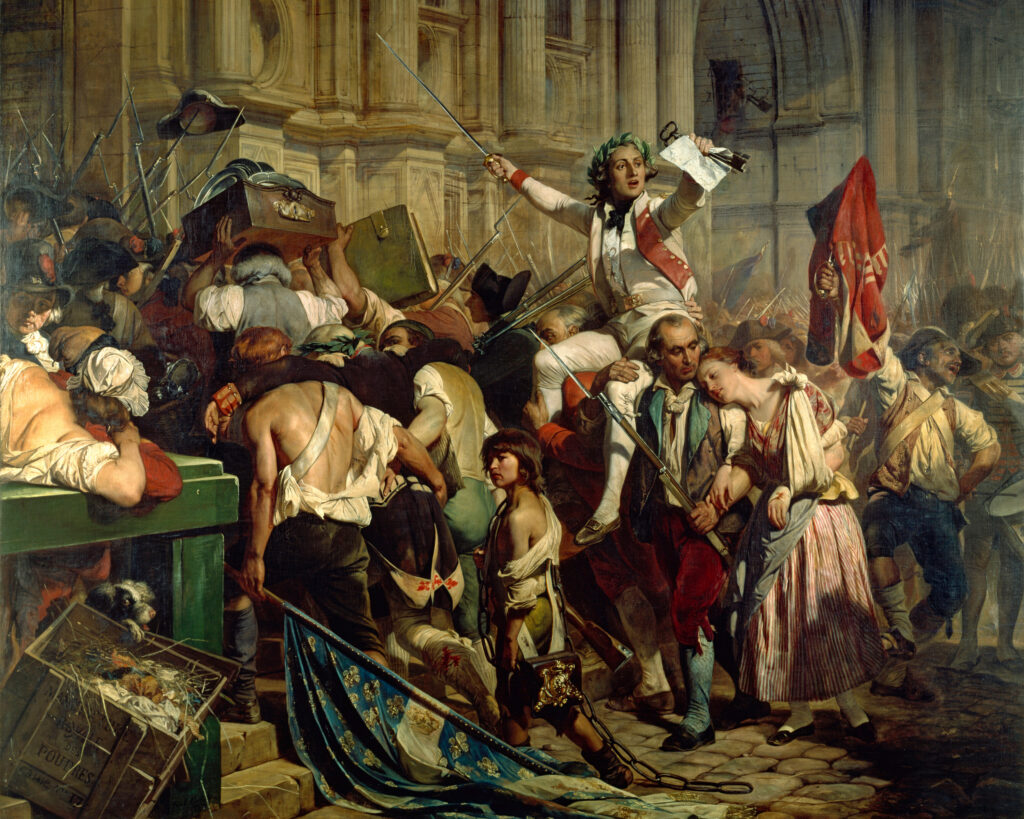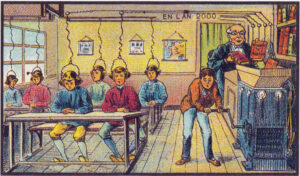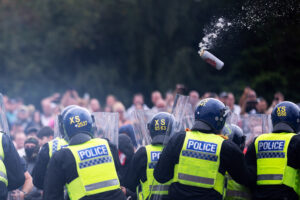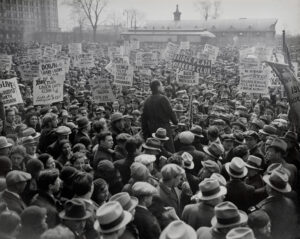The Sorrows of Burkean Liberals

It begins, as these things tend to, with a rumor—ripe, rancid, rolling from lip to lip, cobblestone to cobblestone. After a long, bitter, and hungry winter, the city is agitating for movement, for rupture, for a festival of release. Just as the roses begin to bloom, a pulse quickens. A flush of impatience. A surge of steps.
Why the 14th and not the 15th? Who knows. For the day itself is unremarkable. It rained in the morning. The air was thick. By 2 p.m., the temperature has reached a balmy 72. The rain has stopped, but the clouds refuse to lift, enveloping the city in damp, breathless anticipation.
On the east bank of the river that cleaves the city stands an octopus of masonry. Eight towers, each 100-feet tall, squat and brooding. Their arrow slits, like the ocularium of a knight’s helmet, gaze at the city with mute disdain. Their walls are needlessly thick, as if built not to keep men in but to keep time out.
They are at the gates, hundreds—cobblers, carpenters, coopers; butchers, brewers, bakers, and those expecting dinner. What they lack in command they make up for in numbers. Some traveled from Saint-Germain-des-Prés. Others joined the crowd in the Faubourg Saint-Antoine. They do not march, they do not chant: They seethe.
A delegation is sent to demand the cannon be turned away, the gunpowder handed over to the people. The Governor inside hobbles and hedges. The mood turns. A shot is fired. No one knows from where. Maybe a nervous guard. Maybe a drunk patriot with a loose trigger. It doesn’t matter. The moment is unmoored. A holler. The cracking of musketry. The thundering of cannon. Smoke rolls. Blood flows. The Governor surrenders. His head on a spike.
Chaos, at last, has a name: revolution.
Across the Channel, an aging member of Parliament—still brilliant, still burning—watches the pandemonium with fascination and unease. “England gazing with astonishment at a French struggle for Liberty and not knowing whether to blame or to applaud!,” he writes of the Bastille’s fall. By the end of the 18th century, the fortress had become a meme of French despotism in British imaginations.
He is deeply torn. On one hand, he admits: “the spirit is impossible to not admire.”
The spirit of Liberty is what he has defended all his life. On the eve of the American Revolution, he delivered a heartfelt speech in support of the colonies’ resistance. He praised the Americans for their “fierce spirit of liberty,” calling it “the dissidence of dissent, and the Protestantism of the Protestant religion”—a purer, more principled echo of England’s own political tradition.
And yet, for all his sympathy and brilliance, he was a man of his time and his circumstances. He was no outlaw, no radical; a man not of barricades, but of institutions. An Irishman of modest origin compared to his peers, his parliamentary career was made possible by a series of wealthy, propertied patrons. He was a model citizen in the Age of Reason, and he lived willingly within the cage of its confines. His speeches brim with theatrical passion, with rhetorical bloom, but the arguments themselves are textbook Enlightenment: logic, reason, law, order.
Standing in defiance of that order is the “old Parisian ferocity” that stormed the drawbridges of the Bastille. The chaos unnerves him. He concludes, swiftly and with finality, that the French character—“savage and brutal”—is “not fit for Liberty.” “Men must have a certain fund of moderation to qualify them for Freedom,” he writes. And that French liberty—standing red-white-royal blue atop the corpses of the Past—is, to him, the wrong kind.
“Their liberty is not liberal.”
In his view, American revolutionaries were trying to preserve liberty as an inherited tradition (from England, of course), while the French were erecting liberty on the rubble of everything that came before. The American story, in his mind, is one of continuity, of conservation, of restoration; the French is one of rupture, of uprooting, of reinvention. And that is unacceptable.
Edmund Burke the sentimental redhead considered himself a true liberal. And by 18th-century standards, there is no question he was. He was a Whig. He railed against slavery, condemned British abuses in India, and supported Catholic emancipation in Ireland. Yet his Reflections—more like invectives—on the Revolution in France became a foundational text for modern conservative thought. And for that reason, his name was sealed into the annals of history as the father of modern Western conservatism.
He would have hated that—just as his contemporary Adam Smith would have hated being remembered as a free-market fundamentalist, the patron saint of self-interest. They were members of a mutual-admiration society, Burke and Smith. It’s unclear whether they ever spoke, but their writings—on sympathy, on moral sentiments, on the beautiful and the sublime—moved in silent conversation. And if they are sharing a glass of Negroni in Heaven, one imagines them laughing—one with Irish irony, the other with Scottish deadpan—at the way their names have been used and abused.
This is history. No one gets to control the citations.
But if we let the sentimental redhead reserve the right to call himself a liberal and place ourselves in his restless mind, at his desk, late into the night, reading of the siege of the Bastille, trembling with admiration laced with dread, we witness the beginning of a liberal condition that would reverberate for centuries in the Western world.
This condition is not a theory of government, but a temperament—a mood, a reflex, a psyche that has shaped the behavior of Burkean liberals as much as any version of the liberal doctrine.
This temperament is one of deep ambivalence. An ambivalence that knows what it wants—liberty, equality, justice—yet dreads the implications of their arrival. It desires emancipation but fears upheaval. It preaches change but practices delay. It writes declarations in daylight, then drafts reservations by candlelight.
All men are created equal—but some are more rational, more enlightened, more prepared, more deserving of freedom than others.
Institutions are imperfect—but they are all we have.
The status quo is broken—but the alternatives can only be worse.
Reform is welcome—but only when it passes through the right hands, spoken in the right accent, delivered with the right decorum, authored by the right people.
Revolution might be necessary elsewhere—but revolution at home is always a mistake.
Never abandon the center—even when the center is crumbling beneath your feet.
Always split the difference—even with a hand that is closing into a fist.
It’s the opposite of what Isaiah Berlin calls the Dostoevsky complex—a condition that afflicted the Romantics, many of whom came of age around the French Revolution and were deeply influenced by it. (Johann Gottlieb Fichte was 27 in 1789; the Schlegel brothers were 17 and 22; Caspar David Friedrich was 15; Alexander von Humboldt was 20.) Typical of the Romantic psyche is a craving for absolute freedom, unmitigated self-expression, sometimes conflicted by an equally urgent need for moral reckoning. The tension manifests as rebellion against all external authority, a hunger for authenticity, for aesthetic and emotional absolutism, an urge to feel, to agonize, to choose—even wrongly—and the inner torment that follows. It is young Werther. It is the condition of the Underground man, of Raskolnikov and Ivan Karamazov.
The Dostoevsky complex desires freedom at any cost, even madness. The Edmund Burke complex dreads its cost, even when the status quo is unsustainable.
To be sure, Burke was not without Romantic tendencies. He breaks from his rational-Whig tone when writing of Marie Antoinette in Reflections, recalling their last encounter at Versailles:
“I saw her just above the horizon, decorating and cheering the elevated sphere she just began to move in—glittering like the morning star, full of life, and splendor and joy. Oh! What a revolution! And what a heart must I have, to contemplate without emotion that elevation and that fall!”
This flourish of ornamental grief was famously mocked by Thomas Paine:
“He pities the plumage, but forgets the dying bird.”
Mary Wollstonecraft was even more sarcastic about Burke’s “Gothic affability”:
“Do you, Sir, a sagacious philosopher, recommend night as the fittest time to analyze a ray of light? … Misery, to reach your heart, I perceive, must have its cap and bells.”
Ultimately, Burke’s fleeting Romanticism was reserved for what he called the beautiful, and not the sublime. He yearned for the morning star, not the summer storm. His heart broke for fallen splendor, not for unshackled Liberty leading the people bare-chested, dirty-footed, clothed in blood-stained rags.
Not a contradiction. Just a condition.
At the heart of the Burkean complex lies one word—moderation.
Moderation in what? In one’s desires, in one’s demeanor, in one’s attire, in one’s appetite, in one’s temperament, in one’s ambition, in one’s outrage, in one’s grief, in one’s imagination, in one’s vision. And, collectively, “in all changes in the State.”
Why moderation?
First, Religion. The fabled Protestant ethic—especially in its Calvinist and Puritan variants—valorized inner discipline, self-denial, emotional austerity, radical asceticism, and the perpetual deferral of gratification. Anglo-American and European Liberals—Locke, Montesquieu, Smith, Burke—all drank from the same river of post-Reformation afterflow. Their political ideas were steeped in moral discipline, rational-legal reasoning, a belief in personal accountability, and a deep suspicion of unmanly passions—though not of melancholy (an emotion deemed classy and manly). Their prose was cool, methodical, and largely sober. (Most also lived fairly sober lives.) Burke let a little Catholic heat leak through now and then—he was, after all, an Irishman with a Catholic mother and a professional Westminster speaker, whose oratory was once accused of reeking of “whiskey and potatoes.”
Second, Property. From its inception, liberalism has been an ideology of the propertied upper and middle classes. The early liberals of Europe and America were property owners designing political frameworks to protect what they possessed—including, in some cases, human property. The Glorious Revolution was a settlement between Crown and Parliament, dominated by landowners and merchants, to safeguard the wealth and power of propertied elites. No taxation of the rich without representation by the rich. Locke, writing then, tied natural rights to property rights, making ownership the cornerstone of liberty. The American Constitution enshrined protections for wealth—and for slavery—under the same banner. Burkean fear of the excess of the French Revolution was not just an aversion to violence, but a fear of dispossession: of the loss of wealth, of place, of class position.
Taken together, Liberty, the restless little girl, could never be left alone. She had to be chaperoned: by custom, by class, by the wise custodians of institutions. And always, by the invisible hand of moderation.
If Mr. Burke—as his friends affectionally called him—had lived to witness the liberal revolutions of 1848, in Paris, Berlin, Vienna, and the Kingdom of Hungary, he would have once more found himself suspended between admiration and abhorrence. On a good day, he might have acknowledged the revolutionaries’ call for constitutional government and national dignity, writing something like: “I do not quarrel with improvement, when built on the slow contrivance of human wisdom, not the precipitate leap of metaphysic fancy.” But on a bad day—disgusted by working-class tumult and sensing the stirrings of sedition at home—he might have penned something closer to this: “The homicide philanthropy of France strikes again. The sacred field of Liberty has once more been trampled by the importune grasshoppers of innovation. These Men, unappalled by peril, unchecked by remorse, intoxicated with sublime abstract, have made Liberty no matron of Virtue but a harlot of Spectacle, paraded before the licentious multitude of Sophisters, Economists, and Calculators, whose unfeeling hearts know nothing of Reverence, nor Restraint.”
By June, he would have been pleased to see the liberal elites in Paris finally breaking ranks with the working class: thousands killed, thousands more deported to French Algeria. He would have been pleased to hear his own warnings echoed by a Parisian aristocrat, this time more urgent, more vernacular: Beware la tyrannie de la majorité.
But had Mr. Burke lived to see the socialist revolutions yet to come, he would have shuddered. “No, no,” he would have said. “Absolutely not. What hideous Phantom, what terrifick Spectre. Strike me from your ledgers. Call me by anything but your name—not Liberal, not anymore!”
And he would not have been wrong. As soon as Marx and associates named the elephant in the room, European liberalism recoiled. Its revolutionary ardor curdled into counter-revolutionary anxiety; its emancipatory promise withered into managerial compromise. It would no longer be the ideology of uprising; it would become the architecture of rule.
That rule, as much a preservation of itself as it was a reaction to its revolutionary shadow, doubled down in the century to come.
For socialism emerged as the estranged child of Enlightenment liberalism: conceived in its ideals, raised on its promises, and, ultimately, when those promises were perceived to be broken, turned against it in fury. As a young 1840s liberal of the progressive variant, Marx watched the cynical machinery of bourgeois politics in Prussia and France with growing disillusionment and decided that, he, too, was liberal no more.
If liberalism cherishes freedom of thought, why does it muzzle the press? If it champions emancipation, why does it fire into crowds? If it protects property, why not also the scabbed hands it passes through? If it promises freedom, why are slaves still in chains? If labor is the path to dignity and joy, why do the workers look so exhausted, so broken, so crushed beneath the weight of it all?
The questions piled up. And when the answers failed to come, the new revolutionaries—disillusioned children of 1848 and 1871—drew their own conclusion: Liberalism was not the end of oppression, but its elegant cloak. The liberal state was no neutral arbiter of justice; it was the executive committee of the ruling class and of empire. Here came a new kind of politics that was at once old: Again, a wager was cast on rupture, on transcendence, on the total abolition of the present state of things.
Imagine Mr. Burke again, a few decades later, standing tall in Westminster, still sweating out last night’s debauchery—whiskey and potatoes on his breath—throwing his arms to the heavens: “I TOLD YOU SO!!!”
And he would have been right. The property-loving, order-keeping Mr. Burke would have prevailed—as liberalism did, in England, in America, in the places where it had already flowered. Or, as some might quibble, where it had already seized control.
It would have prevailed, because unlike its Romantic, idealistic, tragically self-immolating offspring, liberalism knows how to survive. It is a master of self-preservation—through moderation: careful concession, tempered adjustment, elegant retreat. Once or twice, in the ruins of Depression and War, it summoned its bolder self. But even this liberalism was, at heart, still cautious—moderately regulating the unregulated, carefully excluding the already excluded. It watched its revolutionary shadow soar too high, too close to the sun, and it quietly clipped its own wings.
It decided: In order not to fall, one must not fly at all.
Slowly but surely, it traded ideals for ideology, beliefs for bureaucracy, vision for administration. Change, yes. But curated, limited, defanged. What couldn’t be stopped would be softened. What couldn’t be softened would be postponed. What couldn’t be postponed would be quietly buried, under procedures, subcommittees, sub-subcommittees.
For a while, this worked. For a time, liberalism offered a plausible compromise between what is right and what is possible. Its metaphysical commitment to moderation, to slowness, to clumsiness—to the messy and the mundane—proved functional enough to endure. Until it didn’t. Until it mistook survival for success, inertia for stability, silence for support, and partial gains for final victory. End of history. Case closed.
But history never ends. It festers. History reminds you, in your dreams, of old accounts unsettled, of debts underpaid, of promises unkept, of wounds never healed.
And one day, you wake up with phantom pain of your clipped wings. You realize you have no future left to chase, only errors to correct. You hear yourself speaking no longer of what you hope for, but only of what you must avoid. And the more you speak of the avoidable, the more strength it seems to gather. So you wrap yourself tighter in what you know best—procedure, forbearance, restraint, delay—until procedure feels like pretext, forbearance like fear, restraint like paralysis, and delay like decay.
Outside, the roses are blooming again. The city gathers heat. You feel its pulse, the vibration beneath the cobblestones. A flush of impatience. A surge of steps.
You wonder if you’ve been here before.
Iza Ding is an Associate Professor of Political Science at Northwestern University and the author of The Performative State (Cornell University Press, 2022). She is spending the 2024–25 academic year in Berlin, in the fall as an Ellen Maria Gorrissen Fellow at the American Academy and in the spring at the Hertie School of Governance.


